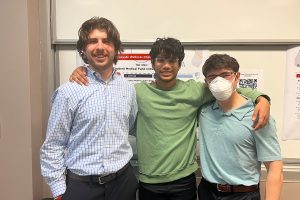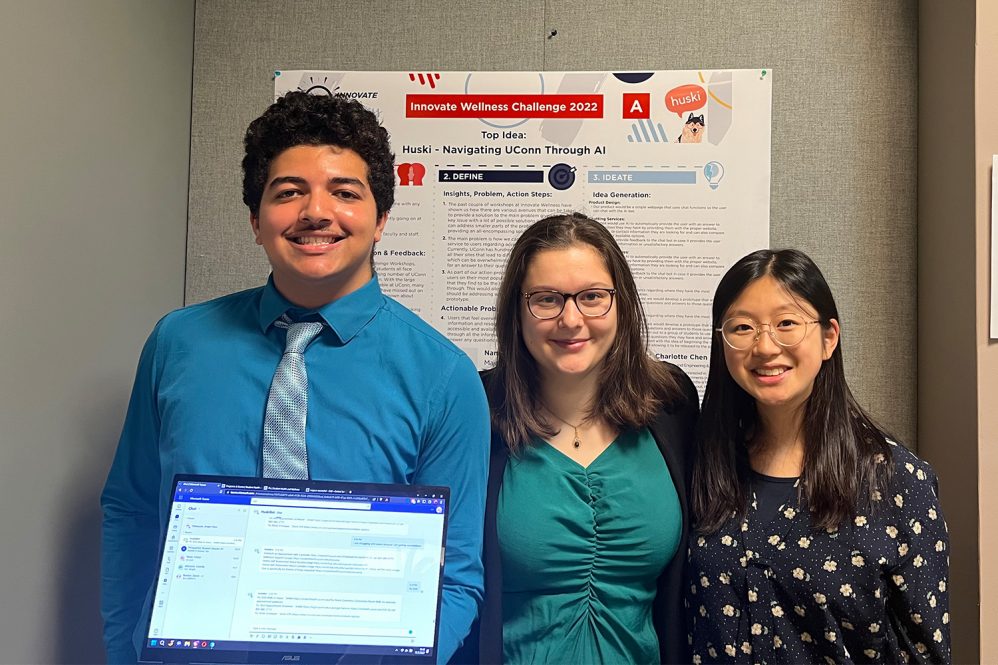Three University of Connecticut engineering students have earned $1,500 in seed funding to develop an AI Chat Bot feature for the Student Health and Wellness (SHaW) website. Audrey Larson ’25 (ENG), Angel Velasquez ’25 (ENG), Charlotte Chen ’24 (ENG, CLAS) competed as a team in the annual UConn Student Health and Wellness Innovate Wellness Challenge, where their proposal earned first place. Each student also received a $500 scholarship.
The Innovate Wellness Challenge is a case competition that brings together students to solve some of the most pertinent health and wellness issues on campus using the design thinking process. This year’s topic was improving accessibility and delivery of services to the campus community.
The winning idea, an artificial intelligence (AI) chat bot called Huski, is designed to help users navigate the SHaW website and support accessing resources. The product would be a simple webpage that uses chat functions so the user can chat with the AI bot. The bot would use AI to automatically provide the user with an answer to any question they may have by providing them with the proper website, resources, or contact information they are looking for and can also compare available options. The user can also provide feedback to the chat bot in case it gives outdated information or unsatisfactory answers.
According to Chen, Larson, and Velasquez, “through the Innovate Wellness Challenge Workshops, we’ve learned that UConn staff and students all face challenges navigating the overwhelming number of UConn web pages and sources of information. With the large number of events and resources available at UConn, many have reported that they feel that they have missed out on opportunities and wished that they had known about resources earlier.”
The students will develop a prototype they plan to launch with SHaW in the near future.
Kenna Grant, health promotion manager for UConn’s Student Health and Wellness, says the Innovate Wellness Challenge provides students the opportunity to engage with critical stakeholders who can offer support and bring their ideas to life.
“The students who participate gain skills in a broad range of ways, empowering students to think of new and innovative ways to establish a culture of wellbeing at UConn,” Grant says. “The Innovate Wellness Challenge showcases a wide range of student voice that really speaks to the passion and dedication of those who participate, and it is so exciting and inspiring to be part of this process with our students.”
Grant says she was impressed with the range of ideas and the students’ pitches at this year’s challenge.
“A lot of the ideas from this years’ challenge seem very realistic, and I believe can be done,” she says. “The student teams really dug into our topic prompt and created concept designs that would support UConn students in a variety of ways. They all presented their ideas with clarity, relatability and feasibility. We are also very proud that a lot of the ideas have generated interest with other groups on campus, and even teams that did not win are still being connected with various resources on campus to bring forth their ideas.”

The second-place proposal, Dining Paw Passport, was created for students who find navigating the dining halls on campus a challenge. The Dining Paw Passport is a tool for students who may have difficulty navigating the dining environments, due to dietary options and accommodations for their nutritional needs. The Passport can be easily transported around campus and has facts about each of the Storrs dining halls. This team, consisting of junior biomedical engineer majors, Sneha Kelkar ’24 (ENG) and Venkat Kidambi ’24 (ENG) created a unique prototype they hope students will find informative and fun to use.
“A popular complaint students have is that the dining hall options aren’t what they’re looking for and don’t accommodate their needs. We gathered insight from a couple of our friends who were fasting for Ramadan. They were not eating properly because they were unaware about where they could access food during early/late hours,” say Kelkar and Kidambi. “We realized how students from different dietary backgrounds were struggling to meet their nutritional goals due to not being able to easily access relevant information.”

The third-place proposal, the Student Medical Fund Initiative (SMFI), was created by Josh Lee ’24 (ENG), Hari Patchigolla ’24 (ENG, CLAS) and Sam Larcome ’24 (ENG, CLAS), with the goal of developing an extension to the Google Chrome web browser where ads would generate revenue to provide funding towards students’ medical expenses.
“Improper access to financial resources plays a critical role in a students’ ability to pay off medical costs, to ease this burden SMFI plans to reimburse student medical costs via the SMFI tab,” according to Lee, Patchigolla and Larcome.
The second- and third-place winners received scholarships and will be offered mentoring opportunities to develop their ideas.
Paula Kalksma McDowell, health promotion project coordinator, who mentored and guided the student teams, enjoyed watching the students develop, refine, and transform their ideas over the course of the six-week challenge.
“As an education professional, the highlight of my job is being part of a student’s overall personal and professional development,” says Kalksma McDowell. “I love witnessing that transformation and helping students find that self-efficacy and inner voice to bring forth their ideas.”
Visit SHaW’s website for more information about UConn’s Innovate Wellness Challenge.



